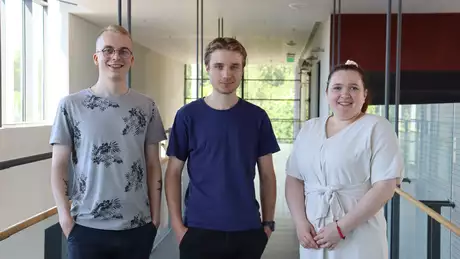
Engineering Programmes at Arcada are stepping into a sustainable future
Published: 28.04.2020 / Education
In order to combat climate change, knowledge about environmental impact is crucial for the new generation of engineers. The understanding of circular economy and skills to calculate carbon footprint are essential. Hence, Arcada has started a unique collaboration with two Finnish companies which are at the forefront in these areas. Saint-Gobain and Bionova offer students at the Department of Energy and Materials Technology the opportunity to try out tools which calculate the life-cycle effects of different construction projects.
According to the goals of the Ministry of the Environment, Finland has become the leading country in circular economy by the year of 2025 and carbon-neutral by 2035. As ”low-carbonness” will be introduced into the directives of construction within the upcoming five years, buildings have to be planned in such a way that they cause less carbon emissions and become more efficient from a life cycle perspective. Hence, construction planners as well as experts in the fields of energy, environment, process and material technology play a key role.
– As the technological development is expected to contribute to environmental-friendly solutions, the calculation of carbon footprint and climate effects is of interest to our engineering students. A systematic assessment using modelling tools helps them in making the right choices already at the planning stage, says Mirja Andersson, Head of Department of Energy and Materials Technology at Arcada.
Arcada takes part in the Kompetens inom cirkulär ekonomi till yrkeshögskolorna project (loosely translated in English: Competencies in circular economy at the universities of applied sciences) which is financed by the Ministry of Education and Culture. Within the framework of the project the teaching in circular economy is developed multisectorally in a total of 19 universities of applied sciences. Nowadays, engineers are increasingly at the centre of decision-making processes in large projects.
– They have to calculate all material and energy flows as well as processes connected to the projects. They also have to assess the environmental effects in accordance with international standards. Thus, calculation tools are indispensable for the new generation of engineers, says Stewart Makkonen-Craig, Proprefect and Senior Lecturer in Materials Science at the Department of Energy and Materials Technology at Arcada at Arcada.
The tool One Click LCA (Life Cycle Assessment), created and developed by the Finnish company Bionova, is the world’s leading tool for calculating life cycle effects. The tool, which calculates environmental effects and life cycle costs, is already in use in 60 countries.
– Despite having access to the general LCA programme, it was evident to us that learning how to use the One Click LCA tool would be a great advantage as far as assessing the environmental effects of construction projects is concerned. Saint-Gobain and Bionova wanted to support us and together they made sure that Arcada got an education licence for free, Makkonen-Craig says.
– It is great that we can collaborate, both in terms of testing out tools and spreading knowledge. The goal is ultimately to prepare a new generation of engineers for becoming developers of a sustainable future, Andersson says.
Find out more about the collaboration here External link (in Finnish).


